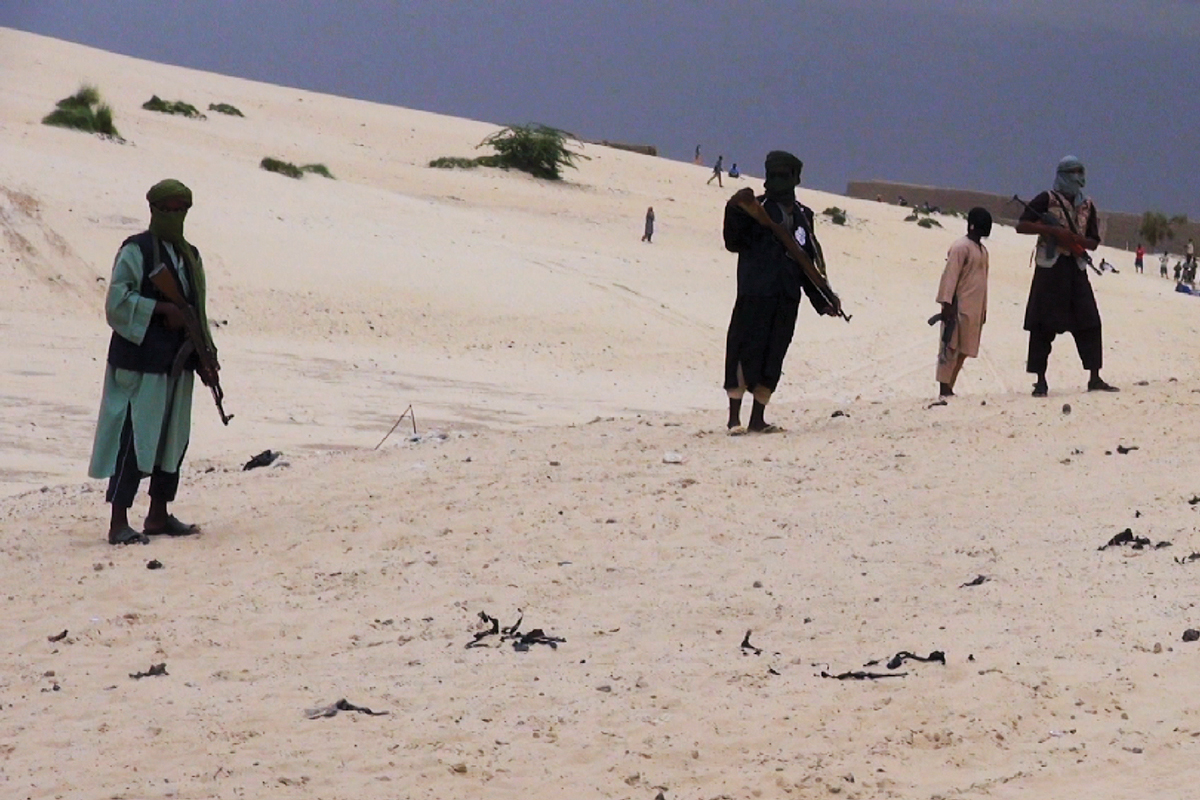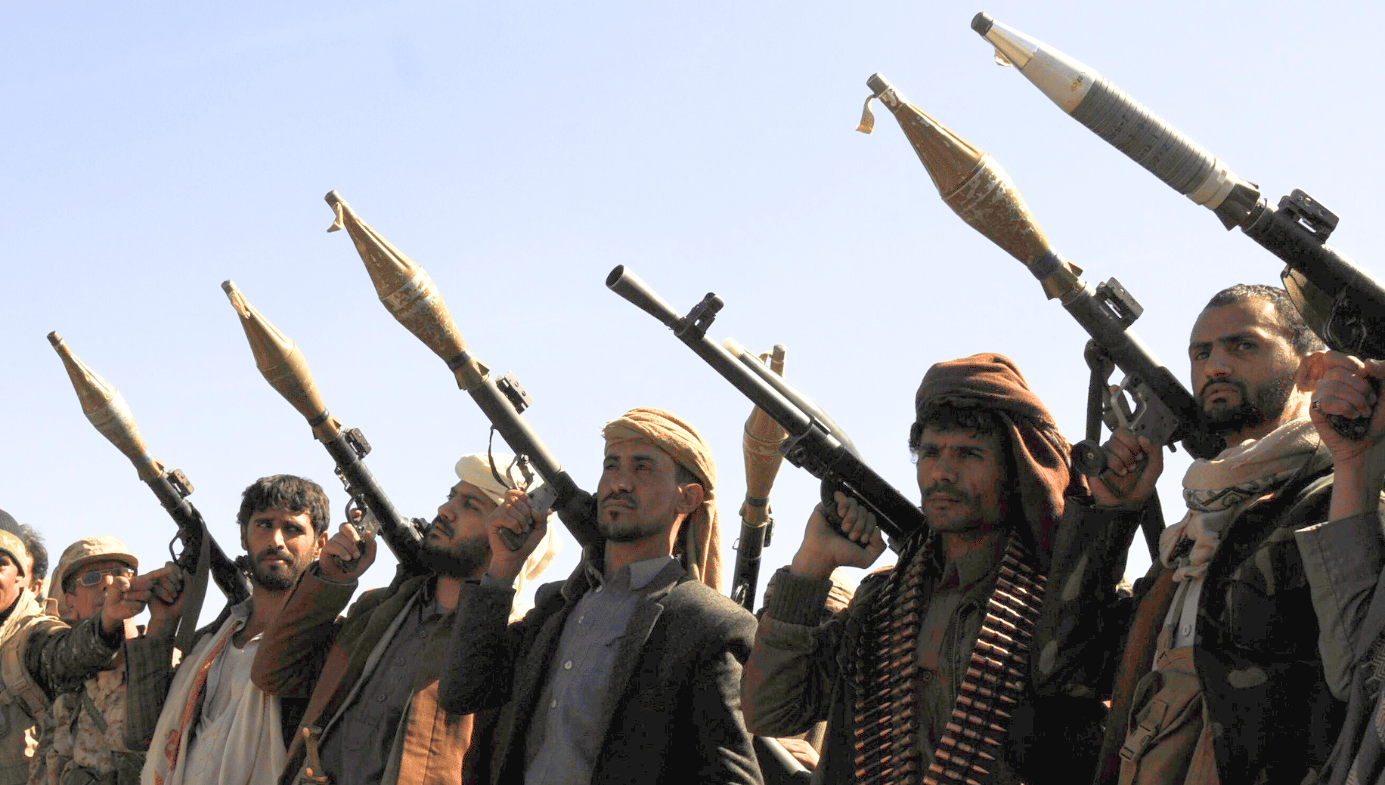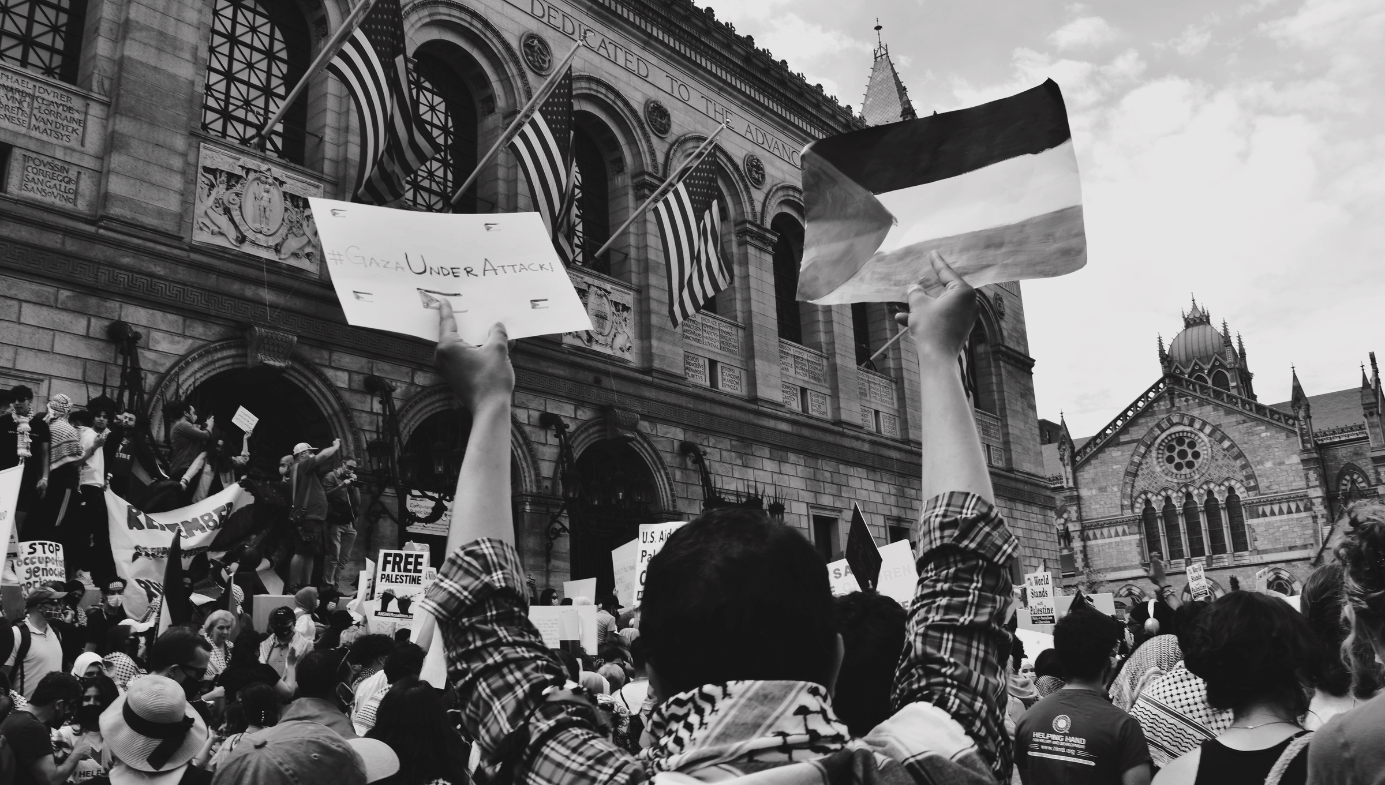Top Stories
"Jihadists"—A Review
In the ongoing debate over terrorism, Jihadists offers a timely reminder of why theology matters.

Jihadists (dir. François Margolin and Lemine Ould Salem, Cinema Libre Studio 2018, 75m)
Some years ago, when assessments of the Arab Spring were at their most optimistic, it became common to hear it suggested that al-Qaeda was, if not defeated entirely, then virtually irrelevant. And yet, with all eyes on the Middle East, towns and cities in Mali would soon be falling like dominoes to al-Qaeda and its Islamist allies. This was the context in which two French filmmakers, François Margolin and Lemine Ould Salem, boldly journeyed to North Africa to document life in territory now governed by sharia law. The result of that trip is an extraordinary documentary entitled Jihadists, an unprecedented, unflinching, and unsettling glimpse into life under Islamist control.
While it is increasingly hard to miss the existence of this totalitarian ideology, the same cannot be said for Margolin and Salem’s film. Worried that Jihadists offered no dissenting voices to counter the extremists featured in the film, France’s National Center of Cinematography expressed concern that, rather than repel people, the film’s stark portrait of Islamic rule might instead serve as Islamist propaganda. The French government agreed, and the film was subsequently handed an “18” certificate—a classification both rare and prohibitive in France. According to Margolin, no documentary has been rated “18” in decades. As a result, Jihadists opened in only three theatres rather than the initially slated 30. It will have a belated American premier on January 25 in New York, followed shortly thereafter by a limited run in Los Angeles. That the film continues to struggle to draw widespread coverage is hardly surprising. Its topic and conclusions run contrary to the prevailing zeitgeist. This is a pity, because Jihadists is a powerful and important document that deserves a bigger audience.
The film begins in Mali, where roadside signs declare that “APPLICATION OF SHARIA IS THE PATHWAY TO HAPPINESS; THE PATHWAY TO PARADISE.” Gun-toting “Islamic police” roam ravaged marketplaces on motorbikes, ensuring that women are dressed with sufficient modesty. Omar Ould Hamaha, a key figure within the al-Qaeda-aligned cabal then running northern Mali, reassures us that “since we started stoning, cutting off thieves’ hands…there’s no more theft.” To his evident relief, he declares that even “little girls” are now veiled. (Such moments reveal much about the Islamist mindset.) Abou Mohamad Toure, chief of the Islamic police in Gao and a commander with the Movement for Unity and Jihad in West Africa, concurs. Apparently unburdened by self-awareness, he points out that “[f]or a long time, we preached in the mosques, went out in the streets, talked to the people and nothing was put in place. But thanks to God, when we took up arms to apply religion, God rewarded us.” It seems He does not move in particularly mysterious ways after all.
The locals, however, do not seem to have got the memo about how much better their lives have become under sharia law. One exasperated Malian Muslim who the filmmakers managed to interview complains that the things that once made life worth living—dancing, cigarettes, music, girlfriends—have now all been outlawed. “The old ways are finished,” he warns. “Everything there was, is over,” another remarks. Thankfully, shortly after the cameras stopped rolling, things improved for the besieged Malians when the French military intervened and pushed the Islamists back. “Force,” Hamaha had told the filmmakers, “is necessary for people to yield to Allah’s will and carry out his orders.” He then discovered that sometimes force is also necessary to reverse these unwelcome developments: in March 2014, he was killed in a French air strike.
The footage from Mali provides the film with its strongest moments. But when ISIS declared its Caliphate while the film was in production, Margolin and Salem naturally felt compelled to refer to events in Iraq and Syria. The brutality of what was happening there dovetails neatly with the Mali footage, but it is also (understandably) sourced from ISIS propaganda videos rather than shot in Caliphate itself. More rewarding is the filmmakers’ journey to Tunisia, which provides a frequently punishing film with some moments of surreal levity. They interview Abou Hamza Attounissi, a member of the al-Qaeda-linked Asnar al-Sharia, who runs an online lifestyle magazine called the Modern Salafist. This is a one-stop shop for advice on fashion, travel destinations (unsurprisingly, Afghanistan and Syria feature prominently), and how to avoid looking at girls. Hamza perfectly typifies the Salafist who despises Western modernity and is also addicted to it. He longs to travel to Syria to join the Caliphate, yet he uses a Mac and readily admits that “we all want the latest iPhone.” He sees no contradiction in “go[ing] to jihad in Syria wearing Nike.”
In the ongoing debate over terrorism, Jihadists offers a timely reminder of why theology matters, and a sharp rejoinder to those academics and analysts determined to downplay its importance as the primary driver behind terrorism and extremism and overplay every other possible driver (economics, racism, historical and geopolitical grievance, and so on). Margolin is explicit on this point in a commentary delivered straight-to-camera at the beginning of the film. While he acknowledges that jihadists are a minority within Islam, he says that it is nevertheless “important to listen to what these people say. They are not crazy. They have not escaped from psychiatric wards. They are not isolated people. They are people who have an ideology…words that we have a hard time hearing.”

It is unfortunate, to put it mildly, that in 2019 we still find ourselves subjected to denialist headlines such as this dismaying recent example in the Observer: “Brain Scans Show Social Exclusion Creates Jihadists, Say Researchers.” Inconveniently, Omar Ould Hamaha saw things quite differently to those University College London researchers. “I didn’t choose to be a jihadist,” he says. “It was a divine imposition, a revelation from Allah.” In his eyes, the sharia law he has helped to impose is not a “personal choice,” but a “divine obligation.” How convenient, you might say, but it is hard to quarrel with the sincerity of Hamaha’s religious fanaticism or that of his colleagues.
A young Mauritanian sheikh, M. Salem, calmly frames ISIS’s position on beheadings as grounded in two separate hadith. “As regards the slitting of throats,” he says, “that comes from a quote from the Prophet: ‘When you kill, kill well, and when you slaughter, slaughter well’.” He also refers to the beheading of a Jewish satirical poet, Ka’b ibn al-Ashraf, by one of Mohammed’s followers. (Jihadists’ theological justification for beheadings is more commonly cited as surah 47, verse 4, of the Koran: “when you meet the unbelievers, smite at their necks.”) Salem’s interpretations may well be utter bunk (the first hadith he invokes deals with the slaughter of animals, not freelance photographers), but it’s virtually impossible to watch Jihadists and conclude that the interpretation is not authentically believed.
Throughout the film, religious fervour and a craving for power are entangled in the interviewees’ sadism, and this seeps out of the scenes of ISIS’s drive-by executions, of gunmen shooting cowering prisoners in the back of the head, and of hands being hacked off while an audience of goons ecstatically yell “Allahu Akbar!” And, predictably, the air is heavy with the stench of paranoid anti-Semitism. Amedy Coulibaly’s attack on a Jewish supermarket in Paris in January 2015 is justifiable, announces Salem, because “between Jews and Muslims it is an endless fight. We are at war.” Hamaha explains that he dyes his beard red because Mohammed warned in a hadith that (in Hamaha’s words) Muslims must not “be like the Jews who don’t dye their beards.” For Margolin, who reveals at the beginning of the film that members of his family were murdered in Nazi concentration camps, this is personal. In North Africa, he is confronted with the same genocidal hatred from those jihadists busily carving up the region and glorifying the assassination of Jews in his home country.
Hatred is the film’s stubbornly recurring theme, repeated like a mantra and directed at a plethora of targets. Hatred of Jews; hatred of women; hatred of homosexuals; hatred of the West and all its works, and in particular its foreign policy. “Man must be in charge,” instructs one Sheikh Hadrami Ould, “as he is more resistant and more reasonable, whereas women are too impulsive.” “Equality,” bellows Salem, “that requires us to treat a man like a woman – no!” Gays are “more like animals than humans,” and should be killed offers Ould, before reciting various hadith in justification of this view. Footage of ISIS pushing men accused of being homosexual from rooftops in Mosul demonstrates this is not just idle talk. And, of course, we hear the usual litany of complaints about Western misdeeds in Algeria, Guantanamo Bay, Abu Ghraib, and Palestine. Democracy’s unwillingness to adopt sharia makes it fatally flawed, says one Mauritanian imam, but it is expedient in one way: “We can use democracy to make ourselves heard.” If the imam had his way, democracy in Mauritania would clearly consist of one man, one vote, one time. Freedom of speech is also denounced and the (then recent) murders of the Charlie Hebdo journalists are universally applauded.
Much of this is profoundly depressing but will be unsurprising to anyone with a passing familiarity of Islamist doctrines. However, the mind-boggling intellectual contortions required by the conspiracy theories that mesmerise the interviewees throw some unexpected curveballs. Sheikh Salem, for example, believes that the puppet master behind the U.S. government’s supposed war on Islam is Robert Spencer (who runs the Jihad Watchwebsite). Salem goes on to praise Mohamed Merah’s murder of French soldiers in 2012 but dismisses the idea that he killed Jewish children, because Islam does not allow for the murder of “infidels who have not fought us.” Merah’s crime, he explains, must have been fabricated by persons unknown “to make this young Muslim look like a person with no humanity.” In the same vein, he warns that we should not be so quick to believe that ISIS were beheading journalist hostages in Syria: “Perhaps,” Salem implausibly suggests, “they are spies who are pretending to be journalists.”
Jihadists performs a vital public service by exposing views like these, which offer a glimpse of how cruelty and sadism can be at once justified and indulged and then rationalised and denied. Unfortunately, the controversy surrounding the film will probably work to its disadvantage. To my British sensibility, the film fully warrants its “18+” rating. Parts of it are extremely graphic, including disturbing raw footage of executions, amputations, and lashings that embed themselves in the mind’s eye. Furthermore, the footage of Margolin speaking to camera and explaining why he made the film was shot and inserted at the behest of the U.S. studio in an attempt to head off controversy; it was not provided to French viewers.

Without this footage, the French authorities’ concerns that the film might unintentionally provide its subjects with propaganda are more defensible. It is worth recalling the response of one of Britain’s most notorious hate preachers, Omar Bakri Mohammed, to Geert Wilder’s anti-Islam film Fitna, which also explicitly tied images of Islamist violence to Koranic injunctions. “It could be a film by the mujahideen,” Bakri approvingly concluded.
Margolin has speculated that, “What has upset the French authorities is not the violence, but the subject itself.” He may be right about that. In July 2016, the Le Monde and La Croix newspapers announced that they would no longer publish the names and faces of terrorists, a decision that betrays the anxieties surrounding religious violence in a country still reeling from a series of harrowing terrorist attacks. Perhaps this precautionary approach makes more sense in cases where the drive for notoriety seems to inspire the act of violence (school shootings, for example). But with Islamist terrorists, it misunderstands what really motivates their atrocities. They are driven not by the desire for column inches, but by the promise of paradise.
And that is why Jihadists deserves and needs to be seen. By letting the Islamists speak for themselves, Margolin and Salem’s film enhances our understanding of why acts of terror keep occurring. It is effective precisely because no attempt is made to mediate or dilute the message with superfluous context, or experts explaining why the jihadists are wrong or cannot possibly mean what they say. Margolin and Salem’s film demonstrates quite plainly that they do mean it. They do believe it. And it is time that we believed them.






